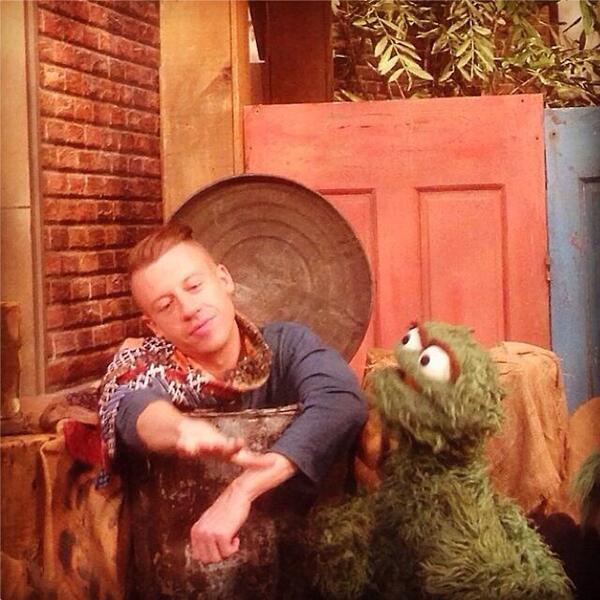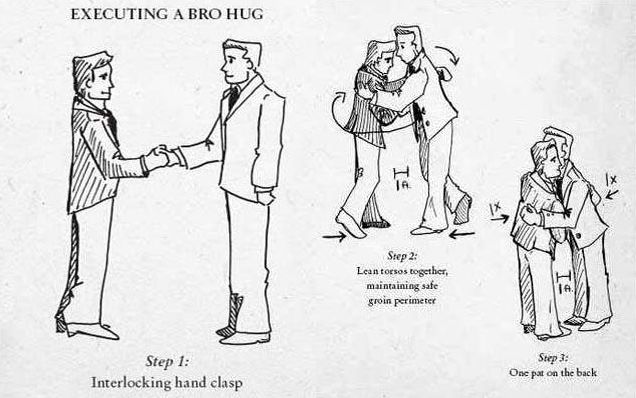A few days ago german GQ has started a campaign called ‘Mundpropaganda‘ (Word-Of-Mouth). It’s a photo series of straight celebrity men kissing. Lots of my gay friends seem to like it. Some because sexy. Some because yay, allies. As ever so often I’ll be the spoilsport. Let me pick a sentence from the GQ editorial to explain why:
“Heteros kissing each other – this kind of courage is absolutely male.”
This sentence should make it clear: It is not a GQ welcome to gays but it is about fake same-sex kisses as heroic act of heterosexual men. Maybe the intention was different, maybe GQ just aims to get the gays without giving actual gay sexuality a room or having a tearjerking ‘social conflict’ section for the christmas edition. I don’t care about the intention, to me the result matters.
To make it a main statement of the campaign that it takes courage for men to kiss each other is the ‘no homo’ of this campaign. At first glance the pictures might look erotic but the surrounding texts and the ‘making of’ clip have the clear message: “It’s really hard for us to do this but we overcame our disgust to show solidarity with you – aren’t we great?”. It is so explicitly stressed that the kisses are fake that it robs those kisses of any shadow of gay desire. The interviews are there for the kissers to state how hard it was for them and that they like kissing women much better. The ‘making of’ clip shows some of them breaking down in laughter when trying to kiss, etc. Parts of this are dangerously close of even redemonising gay sexuality as disgusting and unnatural, no matter if aiming for the opposite. Surrounded by all this talk about how they are fake the actual pictures become a deeply desexualised bro-thing. Thus the kiss does more for reaffirming the kissers’ heterosexuality than actually being the homoerotic protest they want it to be. (For more on this effect I recommend reading “Bro-Porn: Heterosexualizing Straight Men’s Anti-Homophobia”, by Tristan Bridges and C.J. Pascoe)
I don’t know if GQ got the idea from the actually existing creative protest form of queer kiss-ins. Those often include straight allies. It’s not that same-sex straight people making out with each other to protest homophobia is always a bad idea but if they use instant markers to assure they are not really gay it’s a clear sign that it disrespects and sometimes even ridicules queer desire. Also it might be counterproductive to do it for queer people’s applause.
In an effort to not criticise it but instead be a bit of a queer ally for the straight GQ: What would this campaign have had to look like to please me? At best it would have been queer-inclusive sexy kissing, and with ‘queer’ I mean all kinds of gender and sexual orientations. So people look at it and can’t tell a difference, they just see kissing as a sweet sensual erotic act between all kinds of human beings. If you need to limit it to ‘fake kissing’ then why not put a lesbian woman kissing a gay man next to those straight guys. If you don’t want to include women because it’s a ‘gentlemen’s’ magazine, why not have at least gay and trans* men mixed in with the straight guys. The absolute minimum though would have been: If only including straight men DO NOT mark them as such. To speak in celebrities: It’s a bit like the difference between George Clooney and Jake Gyllenhaal. Both often were asked if they are gay. Gyllenhaal makes it very clear that he is not and adds some ‘tits and ass’ remark, in a not so nice ‘real straight men are sexist’ proof-move. Clooney on the other hand says he would never say that he is not gay because that would mark being gay as something he feels the need to distance himself from and that would be disrespectful to gay people.
In this (more-than-slightly-flawed but adding-Clooney-to-a-blogpost-does-no-harm) comparison the ‘Mundpropaganda’ campaign obviously is much further on the Gyllenhaal side of things.

Different dude, similar thing: Macklemore. I only really realised how much I despised Macklemore’s big hit ‘Same Love’ when I heard Angel Haze taking it over:
https://soundcloud.com/angelhazeym/same-love-angel-haze
Her version (here are the lyrics) is so much more empowering. Some efforts of being a straight ally leave no room for actual gay people being heard. They condemn queers to the position of desiring those straights from afar and/or applauding them for – well, in the GQ case, if you think about it: actually for publicly reestablishing straight male disgust of male same-sex kissing.
In “Why We Should Care How Straight Allies Benefit From Their Support” Tristan Bridges and C.J. Pascoe ask:
How much recognition does Macklemore deserve for coming out as a straight ally? (And he lets us know that he’s straight, mentioning early in the song that he’s ‘loved girls since before pre-k,’ and his other hit songs feature a fantastic array of misogynistic lyrics.)
They compare the situation to the ‘economy of gratitude’ often taking place within straight couples:
In her research, (Ariel) Hochschild found that husbands were often given more gratitude for their participation in work around the house than were women. That is, men were subtly—but systematically—“over-thanked” for their housework in ways that their wives were not. This simple fact, argued Hochschild, was much more consequential than it might at first appear. It was an indirect way of symbolically informing men that they were engaging in work not required of them. In fact, we have a whole language of discussing men’s participation in housework that supports Hochschild’s findings. When men participate, we say they’re “helping out,” “pitching in,” or “babysitting.” These terms acknowledge their work, but simultaneously frame their participation as “extra”—as more of a thoughtful gesture than an obligation.
We would suggest that something similar is happening with straight male allies. We all participate in defining the work of equality as not their work by over-thanking them, just like housework is defined as not men’s work. By lauding recognition on these “brave” men in positions of power (racial, sexual, gendered, and in some cases classed) we are saying to them and to each other: This is not your job, so thank you for “helping out” with equality.
Tristan Bridges and C.J. Pascoe warning conclusion from this is:
“Let’s not make anti-homophobia the equivalent of “babysitting” for dads and activism a de facto ‘second shift’ for marginalized folks. The movement toward equality should be everyone’s responsibility and mandate.”
Another point that struck me about that campaign is that by trying to cater to a male gay community GQ adds to an already existing gap between gays and lesbians. In the world of the GQ, a men’s mag that stands for a stylish brand of misogyny that reminds me a bit of old school James Bond, straight women almost exclusively exist as the fuckable other and lesbian women basically don’t exist at all.
I followed a twitter link to another GQ story that has since been taken down: A story in which a man tells us that he was the kind of type who could get every woman so to as a new challenge he set out to turn a lesbian straight. In which he apparently succeeded four pages later. (I only skip-read through the first page and it was every inch as you’d expect it: Misogynist, stereotyping lesbians’ looks, claiming that lesbians are straight women who have not yet been fucked by Mr. Right.) When the first signs of a soc media shitstorm showed GQ took down this story, saying it was from a few years ago and no longer represented their attitude. By now they even have even put an interview with the lesbian activist Yelena Goltsman online. PR disaster prevented? Apparently.
Of course this GQ campaign is not in the first place an advertisement for the magazine but the passages are fluent these days and I see parallels to a certain type of advertising that uses social criticism. Take the #whipit Pantene ad that deals with gender-based double standards.
The message is: “Don’t let labels hold you back. Be strong and shine.” As long as that doesn’t hint at the kind of ‘shining’ that includes women running Jack-Nicholson-style with an axe after the labels that hold them back I can’t really see how shining is supposed to help against double standards. One of the comments on youtube or facebook for the #whipit ad was: “Sell product by convincing your target market that you are more invested in contributing to emotionally charged, globally relevant (…) issues than you are in advertising your product.”
Or take the ‘Beauty Sketches’ Dove ad, a real tearjerker:
Mind that Dove just as well as Axe are part of Unilever which is quite a nice concept: Destroy women’s egos with Axe ads and rebuild them with Dove ads. I guess it’s pretty easy to spot how the social criticism aspect is being emptied of meaning if not even ridiculed by the context.
Same goes for ‘Mundpropaganda’. Think of it as a set-to-go-viral campaign to sell a men’s lifestyle magazine to gay-rights-supportive men and gay men without losing the conservative straight men of their readership. When they write about homophobia they manage to somehow write women out of this by simply not talking about them. They talk about homophobia as if it wasn’t about women and TI* people, too. Also let’s not forget that it is the kind of magazine that caters to a certain type of men: Masculine, self-assured, successful, stylish. Not-so masculine looking, behaving, thinking men or trans*-men are not part of the GQ world. It is about as unqueer as it gets: One-dimensional straight masculinity.
This echoes with some gay men, especially as the negative stigmatising as ‘gay’ is connected to femininity. ‘Gay’ as a slur can be exchanged with ‘like a girl’. The stereotype of the effeminate gay is something many gay men fear to be compared with and maybe the gym-obsessed muscle gay scene as well as the conservative gays are but a reaction to this kind of homophobia. Queer people come in all shapes and sizes and colours and from all classes. That was and should stay a strength of the queer community. Campaigns like ‘Mundpropaganda’ can widen the gap between successful white males and the rest of the LGBTI* community. As Mykki Blanco said: “Homophobia comes from misogyny, the hatred of women. If you can’t see the connection between homophobia and the hatred of women, you’re blind.”
So, however-male-defined brethren, if GQ says “this kind of courage is absolutely male” please don’t drool over those straight guys but rather say: “Suck my left one! Every queer-feminist lady out there has shown more courage and has contributed more to my gay rights than your self-congratulary straight-exclusive campaign!”


Love this extension of the discussion about allies. Thanks!
*blushes*
Thank *you*! Love your work.